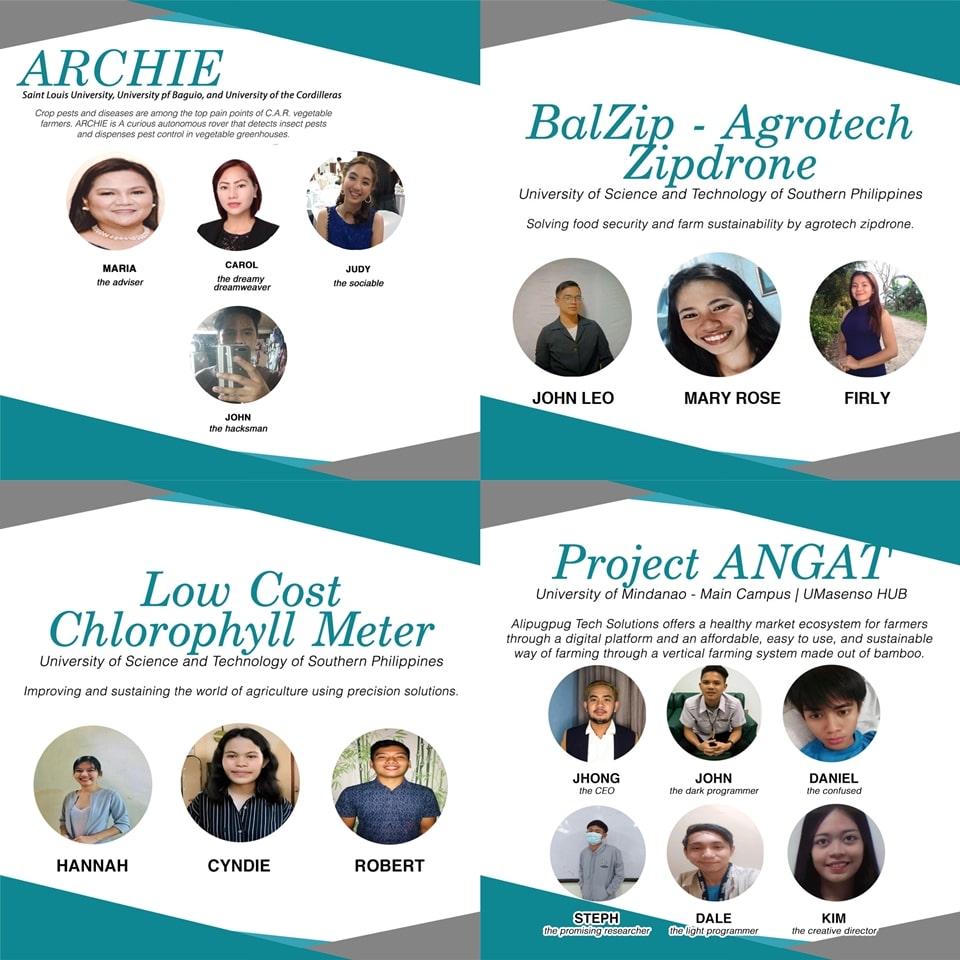
Selected outstanding student teams rose up in developing innovative solutions for the farming sector of the Philippines in the recently concluded Innovation Olympics 2.0 (IO 2.0).
The agri hackathon is jointly organized by East-West Seed with the Southeast Asian Regional Center for Graduate Study and Research in Agriculture (SEARCA), Sensient Colors LLC, University of the Philippines Los Baños (UPLB), UPLB-Technology Transfer and Business Development Office (UPLB-TTBDO), UPLB Startup Innovation and Business Opportunity Linkaging Labs (SIBOL Labs), and APEX: The UPLB Business Network.
Visayas and Mindanao Leg
Team Low-Cost Chlorophyll Meter and Team BalZip – Agrotech Zipdrone, both from the University of Science and Technology of Southern Philippines, bested eight other teams at the Visayas and Mindanao Demo Day of IO 2.0 held online on 27 February 2021.
Dr. Rico C. Ancog, SEARCA Operations Consultant for EIG as well as UP Scientist III and Associate Professor at UPLB School of Environmental Science and Management (SESAM), and Dr. Romeo V. Labios, Operations Consultant for Partnerships, were among the four judges.
Team LowCost Chlorophyl is composed of Mr. Jerry Mae Zarate, Ms. Hannah Jasmin Cinco, Ms. Cyndie Cabusas, and Mr. Robert Mondejar. They developed Chlomet, a low-cost chlorophyl meter device which would help provide the exact measurement of chlorophyll and nitrogen data to increase the crop production with an affordable price.
“Chlomet’s edge is it is cost-effectiveness and has a menu for different types of plant compared to others,” said Ms. Cinco during the pitch. The team representative furthered that Chlomet’s added value to the market is its accessibility through mobile application, a trend in the information age that farmers need to be oriented on and to adapt.
On the other hand, the Cagayan de Oro-based University’s second student team developed BalZip, which is an automated fertilizer application device utilizing a cable suspended drone. This innovation was designed by Mr. John Leo Noval, Ms. Mary Rose Lopez, and Ms. Firly Maribao.
Ms. Lopez said that “aside from the spraying mechanism of BalZip, it also has a sensor which can detect pests and send signal as an alert back to the device.” She added that their contribution to the farmers is helping them spend less time in the field to demand less manpower needed to operate labor operations.
Wild Card Round
On 20 March 2021, six teams from the Luzon and Visayas-Mindanao legs were given a chance to seal their spot in the IO 2.0 Grand Finale during the Wild Card Pitching Day held via Google Meet.
Hailing from Luzon, the first winning team developed ARCHIE or The Agri-Robot for Crop Health, a robot that has the ability to discover diseases and pests on crops. It was developed by Ms. Carol Domalsin of Saint Louis University, Ms. Judy May Mariano from University of Baguio, and Mr. John Ericson Dulay from University of the Cordilleras.
Ms. Domalsin said that “crop pests and diseases are among the top pain points of vegetable farmers. That is why we develop a curious rover that can detect pests and dispenses pest control in vegetable greenhouses."
An exemplary model of SEARCA’s AIG interconnectivity model, Ms. Domalsin highlighted that Project ARCHIE is made up of 24 participants from various sectors in the academe, industry, and government of Benguet province.
On the other hand, Project Angat or the Artificial Systemized Farming Utilizing Vertical Farming Method Integrating Block Chain Marketing was designed by a team from the University of Mindanao composed of Mr. Elpedio M. Corbeta Jr., Mr. John Kaizer B. Taylaran, Mr. Daniel Navarro, Mr. Steph Kier S. Ponteras, Mr. Dale S. Viñalon, and Ms. Kim Aliya M. Tomaro. The Project Angat comprises three interrelated solutions, namely, “Malakas,” “Maganda,” and “Dumangan”.
Malakas is an automated vertical farming system made of bamboo that has its own pump, monitoring sensors, and utilizes solar energy. Meanwhile, Maganda is a water-soluble formula made from waste materials such as banana peels, eggshells, rambutan peeling, and lambanog or the traditional Filipino distilled palm liquor that can simulate plant growth and protect against disease. Mr. Navarro pointed out that the formula is put in a capsule for efficient water automation.
Lastly, the Dumangan is a digital platform that makes Project Angat’s products available to potential buyers and other farmers. He emphasized that “everything that farmers need to operate Malakas can be solved in Dumangan, making the experience more convenient to farmers as they are oriented with technology.”
Dr. Labios and Engr. Christopher T. Cabardo, SEARCA Program Specialist for Technology Transfer, were among the five judges during the Wild Card Demo Day.
These four student teams together with Team FarmJuan of the Asian Institute of Management (AIM) and the Team Automated Irrigation and Nutrient Management System (AIRIN) of the Nueva Vizcaya State University (NVSU) will compete on the National Demo Day in July 2021. The culmination of the competition will determine who among the six teams will receive a grand prize of P200,000 to develop their innovations on the ground.
SEARCA Director Dr. Glenn B. Gregorio reminded the participants that SEARCA together with its partner institutions, conducts innovative hackathons such as IO 2.0 in order to inculcate among the youth the new agriculture mindset which is Agriculture 4.0.
“In order for SEARCA to become a leading enabler and champion of excellence in ARD in Southeast Asia, it is our commitment to hone and mentor the youth who shall become the future innovative leaders of tomorrow,” he concluded.